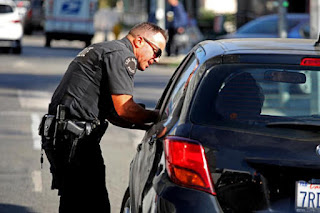Editorial: A Plan To Limit Police Stops Is Stuck In L.A. Traffic. Time To Get It Moving Again
A Los Angeles Police Department officer issues a traffic warning for unsafe driving along Ventura Boulevard in Encino in 2022. ((Gary Coronado / Los Angeles Times)
BY THE TIMES EDITORIALLOS ANGELES (LOS ANGELES TIMES) - Following the police murder of George Floyd on May 25, 2020, and amid calls for a “reckoning” with persistent anti-Black racism in policing, the Los Angeles City Council asked city officials to report on alternative ways to deal with traffic stops.
At the time, the Times editorial board urged caution, especially with the notion of turning over enforcement of moving violations from sworn police officers to the unarmed transportation officers who currently write parking tickets, among other traditionally nonconfrontational duties.
Caution, yes. But for heaven’s sake, it’s been 3½ years. It's time to move forward with a plan. A draft report on traffic stops finally began circulating unofficially in April, and in the months since, a final report has been said to be just around the corner. But not yet.
No more delays. Action is needed for two reasons.
The Times has documented racial bias in police traffic stops and vehicle searches for contraband. In trying to crack down on gun violence in Black and Latino communities — a worthy goal — police made it difficult for young male drivers, in particular, to go about their daily business without being repeatedly stopped on minor pretexts. A series of Times stories found more stops, but less contraband recovered, among Black and Latino drivers as compared with white drivers.
Police-driver encounters also too often end in needless confrontation, and sometimes police-initiated violence.
At the same time, Los Angeles and other communities are struggling with violence of another kind — pedestrians, cyclists and others killed by reckless driving and excessive speed. Recent high-profile cases include the hit-and-run deaths of four Pepperdine students in Malibu on Oct. 17. Police patrols have been inadequate to the task of curbing dangerous driving.
The two problems — death and injury from reckless drivers, and needless violence in police-driver encounters — can be intertwined. On Jan. 7, Memphis police stopped motorist Tyre Nichols for alleged reckless driving. They pulled him from his car, then pepper-sprayed, tasered and beat him. He died three days later. An investigation found no probable cause for the stop.
The list of drivers stopped by police for minor violations and then killed is far too long, and includes such notorious cases as Daunte Wright and Philando Castile.
Los Angeles has now produced an additional reason to be concerned about police traffic stops. In August, The Times reported that members of an LAPD gang unit were under investigation for routinely turning off their body cameras during such stops. The officers involved have reportedly been investigated for theft from drivers and other misconduct.
In the absence of City Hall action, the momentum in dealing with traffic enforcement has passed to Sacramento. A modest bill by state Sen. Steven Bradford (D-Gardena) would prevent police from stopping cars and citing drivers for very minor violations such as a single broken taillight. Bradford pulled Senate Bill 50 from consideration this year amid steep opposition from law enforcement groups, but it will be back in 2024 and deserves passage.
Meanwhile, Gov. Gavin Newsom signed Assembly Bill 645, which permits Los Angeles and five other cities to try automated speed cameras to ticket motorists who egregiously exceed the speed limit in school zones or on streets that have high numbers of traffic injuries or problems with street racing.
Traffic enforcement isn't the only answer — street design can slow drivers, too. Federal officials want to require automatic emergency braking.
One of the options suggested in the city's draft report is to use unarmed transportation officers to ticket drivers for moving violations.
The notion sparked national ridicule, mostly among observers who misunderstood the idea. In a May episode of the NPR quiz show “Wait, Wait, Don’t Tell Me,” participants appeared to believe the proposal was for drivers to ticket each other.
Guest host Alzo Slade asked panelist Paula Poundstone, “A new report from Los Angeles' Department of Transportation says that most traffic stops could be done by whom? Let me give you a hint: It takes a village of narcs.”
“Oh, it could be done by other drivers,” Poundstone replied. “Yes,” Slade said. “Regular people.”
No, the City Council motion from 2020 has not resulted in a recommendation that drivers ticket each other. But it hasn’t resulted in much else, either. If City Hall is to be taken seriously, it must act seriously. Or else pull over while state lawmakers move forward.



Comments